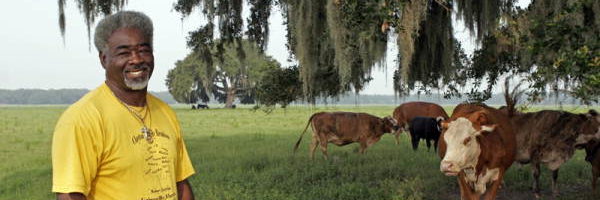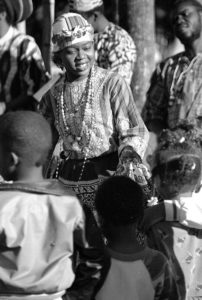Africa in Florida Folk Life

The arrival of African people in Florida during the 16th century transformed the cultural landscape, and since that time African culture has played a significant role in shaping Florida folk life. Despite enslavement, oppression and marginalization of African people and their descendants throughout the centuries, African foods, farming techniques, languages, art, religion, dance, folklore, music and other practices were integrated into Florida’s cultural fabric. Today, African culture and history in Florida is preserved in the history and culture of African-American communities throughout the state, and African influence is refreshed by the arrival of new immigrants from Africa each year. Explore the links below to learn more about the contributions of African people and culture to plants, animals, recipes, places, literature and music in Florida.
Amanulu de Remy of the Haitian Rara band Konbo Guinyn performing in Miami (1990). Florida Memory
African Threads in Florida’s Cultural Fabric
Plants

African food crops have shaped Florida food and agriculture for several centuries, and a wide variety of African plants continue to grow in gardens throughout the sunshine state. A beginning gardener can easily plant the path to better nutrition by exploring African and African-American foods and folk culture.
Animals
 A wide variety of African animals play a key role in the history of farming in Florida, and many more African animals have been recently introduced to Florida to create new markets and more sustainable farming systems. African livestock often demand less inputs because they are better adapted to Florida’s climate.
A wide variety of African animals play a key role in the history of farming in Florida, and many more African animals have been recently introduced to Florida to create new markets and more sustainable farming systems. African livestock often demand less inputs because they are better adapted to Florida’s climate.
Recipes

African foods, cuisine and food preparation techniques have influenced American food culture, particularly in the southern United States. Many African folk foods have been preserved in African-American soul food, and recently introduced African foods offer new and inexpensive ways to eat healthy.
Places
 Florida’s cultural landscape was transformed by the arrival of African people in Florida. African and African-American influences are central in several historic communities and neighborhoods, as well as historic sites throughout the state. Many of these places continue to preserve African and African-American history and culture today.
Florida’s cultural landscape was transformed by the arrival of African people in Florida. African and African-American influences are central in several historic communities and neighborhoods, as well as historic sites throughout the state. Many of these places continue to preserve African and African-American history and culture today.
Literature
 African literary styles, storytelling traditions, oral histories and folk tales permeated Florida literature and folk stories. African cultural elements such as religion, cooking, history, parables, and symbols come to life in the books and writing of famous Floridian authors, poets, and songwriters.
African literary styles, storytelling traditions, oral histories and folk tales permeated Florida literature and folk stories. African cultural elements such as religion, cooking, history, parables, and symbols come to life in the books and writing of famous Floridian authors, poets, and songwriters.
Music

African beats, rhythm, instruments and style have infused musical culture in Florida for centuries. From the labor songs emerging from plantations to gospel, blues, symbols jazz and rock n’ roll, African music lives in churches, dance halls, concerts, and music festivals throughout Florida today.
References and Resources
Carlson, Amanda and Robin Poynor, eds. Africa in Florida: Five Hundred Years of African Presence in the Sunshine State. Gainesville: University Press of Florida, 2013. 528 pp.
Mullin, Michael. 1994. Africa in America: slave acculturation and resistance in the American South and the British Caribbean 1736-1831. University of Illinois.
Holloway, Joseph. E. eds. 2005. Africanisms in American Culture. Indiana University Press.
‘Florida’s South African Roots’ in Florida Gardening Jun/Jul 2002 V5 No. 5
African Livestock Breeds in the US. Ohio State University, Animal Science
SF African Humanities Library Guide
UF African Studies Study Guide
African American Research Library and Cultural Center, Fort Lauderdale.
Florida Memory State Library and Archives of Florida
Harris, Jessica B. 2011. High on the Hog: a culinary journey from Africa to America. New York: Bloomsbury.
Twitty, Michael W. 2017. The Cooking Gene: a journey through African American culinary history in the Old South. New York: Harper Collins.
